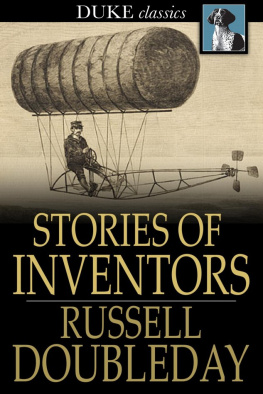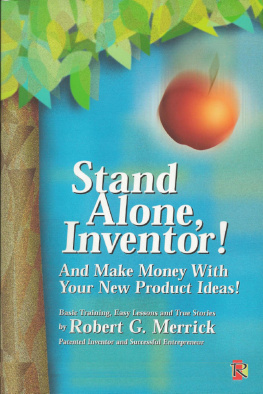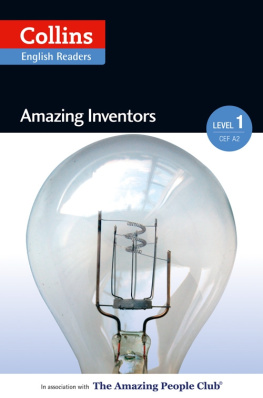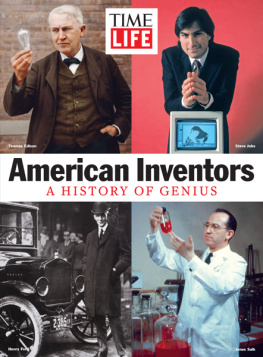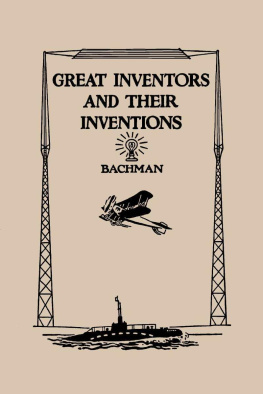STORIES OF INVENTORS
THE ADVENTURES OF INVENTORS AND ENGINEERS
* * *
RUSSELL DOUBLEDAY
*
Stories of Inventors
The Adventures of Inventors and Engineers
First published in 1904
ISBN 978-1-62011-637-1
Duke Classics
2012 Duke Classics and its licensors. All rights reserved.
While every effort has been used to ensure the accuracy and reliability of the information contained in this edition, Duke Classics does not assume liability or responsibility for any errors or omissions in this book. Duke Classics does not accept responsibility for loss suffered as a result of reliance upon the accuracy or currency of information contained in this book.
Contents
*
Introduction
*
There are many thrilling incidentsall the more attractive because oftheir truthin the study, the trials, the disappointments, theobstacles overcome, and the final triumph of the successful inventor.
Every great invention, afterward marvelled at, was first derided. Eachgreat inventor, after solving problems in mechanics or chemistry, had toface the jeers of the incredulous.
The story of James Watt's sensations when the driving-wheels of hisfirst rude engine began to revolve will never be told; the visions ofRobert Fulton, when he puffed up the Hudson, of the fleets of vesselsthat would follow the faint track of his little vessel, can never be putin print.
It is the purpose of this book to give, in a measure, the adventurousside of invention. The trials and dangers of the builders of thesubmarine; the triumphant thrill of the inventor who hears for the firsttime the vibration of the long-distance message through the air; thedaring and tension of the engineer who drives a locomotive at onehundred miles an hour.
The wonder of the mechanic is lost in the marvel of the machine; thedoer is overshadowed by the greatness of his achievement.
These are true stories of adventure in invention.
How Guglielmo Marconi Telegraphs Without Wires
*
A nineteen-year-old boy, just a quiet, unobtrusive young fellow, whotalked little but thought much, saw in the discovery of an olderscientist the means of producing a revolutionising invention by whichnations could talk to nations without the use of wires or tangibleconnection, no matter how far apart they might be or by what they mightbe separated. The possibilities of Guglielmo (William) Marconi'sinvention are just beginning to be realised, and what it has alreadyaccomplished would seem too wonderful to be true if the people of thesemarvellous times were not almost surfeited with wonders.
It is of the boy and man Marconi that this chapter will tell, andthrough him the story of his invention, for the personality, thetalents, and the character of the inventor made wireless telegraphypossible.
It was an article in an electrical journal describing the properties ofthe "Hertzian waves" that suggested to young Marconi the possibility ofsending messages from one place to another without wires. Many mendoubtless read the same article, but all except the young Italian lackedthe training, the power of thought, and the imagination, first toforesee the great things that could be accomplished through thisdiscovery, and then to study out the mechanical problem, and finally tosteadfastly push the work through to practical usefulness.
It would seem that Marconi was not the kind of boy to produce arevolutionising invention, for he was not in the least spectacular, but,on the contrary, almost shy, and lacking in the aggressive enthusiasmthat is supposed to mark the successful inventor; quiet determinationwas a strong characteristic of the young Italian, and a studious habitwhich had much to do with the great results accomplished by him at soearly an age.
He was well equipped to grapple with the mighty problem which he hadbeen the first to conceive, since from early boyhood he had madeelectricity his chief study, and a comfortable income saved him from thegrinding struggle for bare existence that many inventors have had toendure. Although born in Bologna (in 1874) and bearing an Italian name,Marconi is half Irish, his mother being a native of Britain. Having beeneducated in Bologna, Florence, and Leghorn, Italy's schools may rightlyclaim to have had great influence in the shaping of his career. Certainit is, in any case, that he was well educated, especially in his chosenbranch.
Marconi, like many other inventors, did not discover the means by whichthe end was accomplished; he used the discovery of other men, and turnedtheir impractical theories and inventions to practical uses, and, inaddition, invented many theories of his own. The man who does old thingsin a new way, or makes new uses of old inventions, is the one whoachieves great things. And so it was the reading of the discovery ofHertz that started the boy on the train of thought and the series ofexperiments that ended with practical, everyday telegraphy without theuse of wires. To begin with, it is necessary to give some idea of themedium that carries the wireless messages.
It is known that all matter, even the most compact and solid ofsubstances, is permeated by what is called ether, and that thevibrations that make light, heat, and colour are carried by thismysterious substance as water carries the wave motions on its surface.This strange substance, ether, which pervades everything, surroundseverything, and penetrates all things, is mysterious, since it cannot beseen nor felt, nor made known to the human senses in any way;colourless, odourless, and intangible in every way, its properties areonly known through the things that it accomplishes that are beyond thepowers of the known elements. Ether has been compared by one writer tojelly which, filling all space, serves as a setting for the planets,moons, and stars, and, in fact, all solid substances; and as a bowl ofjelly carries a plum, so all solid things float in it.
Heinrich Hertz discovered that in addition to the light, heat, andcolour waves carried by ether, this substance also served to carryelectric waves or vibrations, so that electric impulses could be sentfrom one place to another without the aid of wires. These electric waveshave been named "Hertzian waves," in honour of their discoverer; but itremained for Marconi, who first conceived their value, to put them topractical use. But for a year he did not attempt to work out his plan,thinking that all the world of scientists were studying the problem. Theexpected did not happen, however. No news of wireless telegraphyreached the young Italian, and so he set to work at his father's farm inBologna to develop his idea.
And so the boy began to work out his great idea with a doggeddetermination to succeed, and with the thought constantly in mindspurring him on that it was more than likely that some other scientistwas striving with might and main to gain the same end.
His father's farm was his first field of operations, the smallbeginnings of experiments that were later to stretch across manyhundreds of miles of ocean. Set up on a pole planted at one side of thegarden, he rigged a tin box to which he connected, by an insulated wire,his rude transmitting apparatus. At the other side of the garden acorresponding pole with another tin box was set up and connected withthe receiving apparatus. The interest of the young inventor can easilybe imagined as he sat and watched for the tick of his recordinginstrument that he knew should come from the flash sent across thegarden by his companion. Much time had been spent in the planning andthe making of both sets of instruments, and this was the first test;silent he waited, his nerves tense, impatient, eager. Suddenly the Morsesounder began to tick and burr-r-r; the boy's eyes flashed, and hisheart gave an exultant boundthe first wireless message had been sentand received, and a new marvel had been added to the list of world'swonders. The quiet farm was the scene of many succeeding experiments,the place having been put at his disposal by his appreciative father,and in addition ample funds were generously supplied from the samesource. Different heights of poles were tried, and it was found that thedistance could be increased in proportion to the altitude of the polebearing the receiving and transmitting tin boxes or "capacities"thehigher the poles the greater distance the message could be sent. Thesuccess of Marconi's system depended largely on his receiving apparatus,and it is on account of his use of some of the devices invented by othermen that unthinking people have criticised him. He adapted to the use ofwireless telegraphy certain inventions that had heretofore been merelyinteresting scientific toyscurious little instruments of no apparentpractical value until his eye saw in them a contributory means to agreat end.

